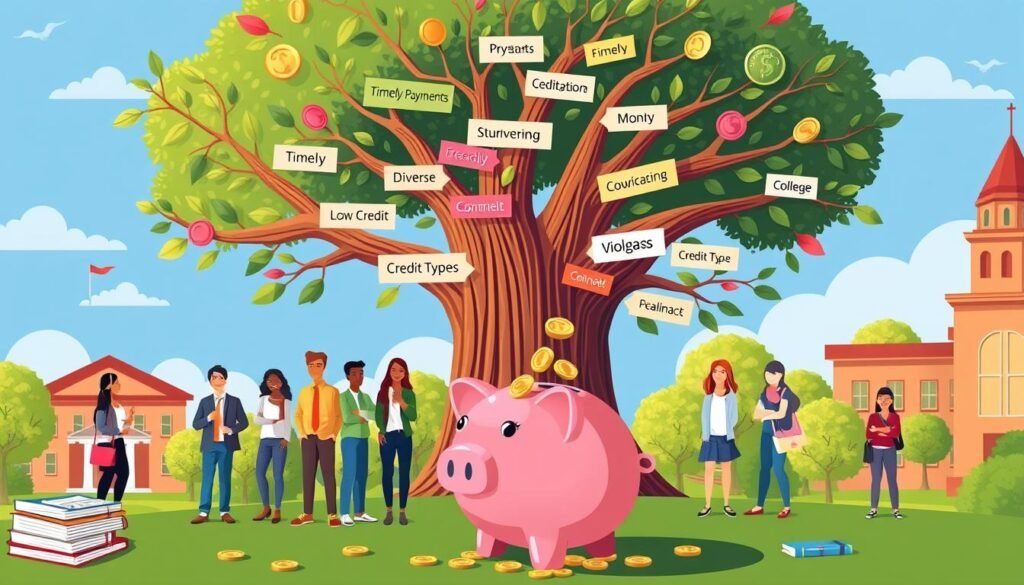This post may contain affiliate links, which means I may earn a commission if you purchase through these links at no extra cost to you
When I was in college, I did not know anything about credit. I gradually learned that building a strong credit history could help your financial future.
It’s tough to balance school and money, but knowing how to build credit can set you up for success. Starting early with credit can ease major life steps after college, like renting or getting a loan. It’s crucial to begin early for financial steadiness and to learn money smarts.
Good credit is not just for borrowing money. It can also save you lots of cash through lower rates on loans and mortgages. Plus, a high credit score keeps debt low and helps manage money well.
Table of Contents
ToggleUnderstanding the Importance of Credit
Having a strong credit history is essential. It affects many parts of life, not just loan approval. One of the best credit building tips is to learn about credit early. This sets you up for a stable future.
Paying bills on time can lead to a better credit score for college students. A good credit score means you’ll get better deals on big buys, like loans or homes. It’s important to keep your credit use under 30% to maintain a healthy credit score.
Getting your first credit card is a great step in building credit. Using a low-limit card wisely can start you on a path to a good credit standing. But, missing payments can damage your score and lead to extra charges.

Your credit score also influences loan approvals and interest rates. Students with good credit find better financial offers after school. Check your credit reports often to catch mistakes or fraud early.
Creating a budget is a smart way to handle your money and avoid excessive spending. Sticking to a budget helps ensure you pay bills on time. Agreeing to pay for utilities at a shared apartment can also improve your credit by showing you can make timely payments.
But, having too many credit cards can be tough to manage. Each new card application can lower your score a bit. Picking your first credit card carefully and using it well is key to good credit. A score over 670 is considered good by Experian.
Getting Started: How to Build Credit as a College Student
Building credit in college is key for your financial future. Starting early with the right approach can lead to success. Focus on education, managing your first credit card, and exploring different options.

Start Learning About Credit Early
Learning about credit early is crucial. Know the basics—like paying bills on time and keeping balances low. Good credit habits set the foundation for a strong credit score. On-time payments can impact up to 40% of your score. Credit monitoring services give insights on your score.
Opening Your First Credit Card
Picking your first credit card is important. Look at options such as secured credit cards with a security deposit. This teaches responsible use. Student credit cards usually have lower fees and better terms. Don’t apply for many cards at once; it can hurt your score. Being an authorized user on a family member’s card helps too.
Understanding Credit Card Options
Student credit card options are varied. Look for cards without annual fees and with rewards. Leslie Tayne advises choosing wisely to avoid extra costs. Know how fees, rates, and rewards work before choosing your card. Too many hard inquiries in a short time can look bad to creditors.
Starting credit early in college helps you build a long credit history. Adopt smart practices like spending only what you can pay off. Always pay on time and in full. Checking your scores yearly at AnnualCreditReport.com keeps you on track.
Choosing the Right Credit Cards for Students
For college students, picking the right credit cards is key to wealth building. It’s essential to carefully compare credit card benefits. This guide will help you choose wisely.
Secured Credit Cards vs. Unsecured Credit Cards
Starting a good financial life often means choosing between secured and unsecured credit cards. Secured credit cards require a deposit, lowering risk and making them easier to get. For instance, the Discover it® Secured Credit Card needs a deposit but gives rewards and a way to upgrade to an unsecured card.
Meanwhile, unsecured credit cards don’t need a deposit and can offer more benefits. The Chase Freedom Rise® is an unsecured option with no annual fee. It also gives you 1.5% cash back on purchases, perfect for beginners wanting rewards without costs.
Looking for Cards with No Annual Fees
Students need to cut costs. Choosing no annual fee cards avoids extra charges. The Discover it® Student Chrome and Chase Freedom Rise® have no annual fees and great cash back offers, making them top picks for students. Also, the Firstcard® Secured Credit Builder Card has no annual fee or credit check but offers cash back.

Exploring Rewards Programs
Rewards can boost your spending power. Student credit cards often reward spending on food, fun, and Amazon orders. For example, the Capital One Savor Student Cash Rewards Credit Card gives 8% back on Capital One Entertainment and 3% on groceries. The Discover it® Student Cash Back Card matches all cash back for new cardholders after one year.
Here’s a closer look at some top student credit cards:
| Card | Rewards | Annual Fee |
|---|---|---|
| Discover it® Student Chrome | 2% cash back at gas stations and restaurants on up to $1,000 in each quarter; Unlimited Cashback Match for new cardholders. | No |
| Capital One Savor Student Cash Rewards Credit Card | 8% Cash Back on Capital One Entertainment purchases, 3% back on groceries. | No |
| Chase Freedom Rise® | 1.5% cash back on every purchase. | No |
Evaluate each card’s benefits, like rewards, fees, and requirements. This will help you find the right card for a strong financial start.
Managing Credit Usage and Utilization
Managing credit well means keeping a low credit utilization ratio. This is important for a good credit score. It’s really important for students new to credit cards and managing money.
Keeping Your Credit Utilization Rate Low
Understanding credit utilization is vital for students. It’s the portion of your credit you’re using at any time. Keep it under 30%, but aiming for 10% is best. For instance, with a $1,000 credit limit, try not to go over $100.
Tracking Your Spending and Payments
Watching your spending and payments is key. As a student, knowing where your money goes can prevent debt. Since payment history is 35% of your FICO score, pay on time. Tracking spending helps find ways to save.
Setting Up Mobile Alerts
Setting mobile alerts for payments and balances is helpful. These alerts remind you to pay on time. This keeps your utilization low. It prevents late fees and boosts your credit score by showing a good payment history.
The Role of Student Loans in Building Credit
Understanding how student loans impact your credit score is key. They are often the first big financial duty for many students. Handling them well can really help your credit score over time.
Understanding Borrowing Responsibility
Knowing your responsibility when you borrow is important. It helps to know your loans’ terms to avoid financial issues. Private and federal student loans are different. Federal loans often have plans based on your income.
The average student loan is $38,787, with a typical payment of $203. Paying interest early can cut down what you owe and save money long-term.
Repayment Strategies to Boost Credit Scores
Paying student loans on time can improve your credit score. Even one late payment can hurt it a lot. Federal loans allow a 90-day delay before reporting, but private loans only wait 30 days.
Try these repayment tips:
- Making payments while still in school reduces your total interest.
- Income-driven plans help manage your payments based on what you earn.
- Automatic payments might get you a discount on your interest rate.
- Watching your spending helps avoid missed payments and extra fees.
Student loans can make your credit mix more diverse, which is good for your score. Always check your credit to spot errors early.
Becoming an Authorized User on a Family Member’s Credit Card
Becoming an authorized user on a family member’s credit card can help students. It lets you share the primary user’s credit history. This is great for building credit history. You don’t have to pay the balances, but you still get the credit benefits.
It’s smart to add a student to a credit account early. This move aids in building credit history. It also prepares you for future financial steps. You can learn about money, making payments on time, and managing credit right.
Young folks often hit a wall when trying to get their first credit. Banks and unions may say no due to no credit history. Being an authorized user can get around this roadblock. It paves the way to enter the world of credit smoothly.
| Key Benefits | Potential Drawbacks |
|---|---|
| Access to the primary user’s credit history | Primary cardholder’s poor habits can affect your credit |
| No obligation to pay balances | Requires mutual trust and responsibility |
| Builds credit without a credit check | May not be necessary if you qualify for your own credit card |
The process to become an authorized user is simple. You’ll need to provide some personal information. Banks have different rules for how old you need to be. For example, American Express asks you to be at least 13. This way, young people can start building their credit early. This sets them up for success in their financial lives.
Reporting Additional Bills to Credit Bureaus
College students concerned about their financial future should think about reporting more bills to credit bureaus. This can improve their credit score. They can do this through programs like Experian Boost. This program adds utility and phone bills, and subscription services to your credit report.
There are three main credit bureaus: Equifax, TransUnion, and Experian. They track your financial history. Adding payments like rent or subscriptions helps your credit score. Your credit score can go from 300 to 850. Timely payments help increase it.
Experian Boost is helpful for college students with little credit history. By paying rent, car notes, and other bills on time, students can look better to lenders. This could lead to better loan interest rates.
Updating your credit report regularly improves financial health. Using Experian Boost or other methods matters. Lowering your debt over time also boosts your credit score.
Final Thoughts
Starting early with credit management sets you up for a stable financial future. Knowing the value of credit helps you make smart decisions now and later. A study shows 61% of college students see a good credit score as key for buying a car or home (Experian, 2023).
First steps include learning about credit cards and finding ones without annual fees. It’s also about getting to know reward programs. With knowledge, 73% of students feel they can handle credit card debt better than before (Credit Karma study). Staying informed and proactive is vital for financial health. Keep your credit use under 30% and track spending with mobile alerts.
To improve your credit, handle student loans well and report bills like rent (RentPlus can help). Also, being added to a family member’s credit card helps. Watch your credit report for mistakes or fraud. The 50-30-20 rule is a smart way to manage money, balancing needs, savings, and debts.
Making these steps a part of your daily life boosts your credit and leads to financial success. Focusing on credit education now sets a strong foundation for your future goals. The actions you take today shape your financial tomorrow.



